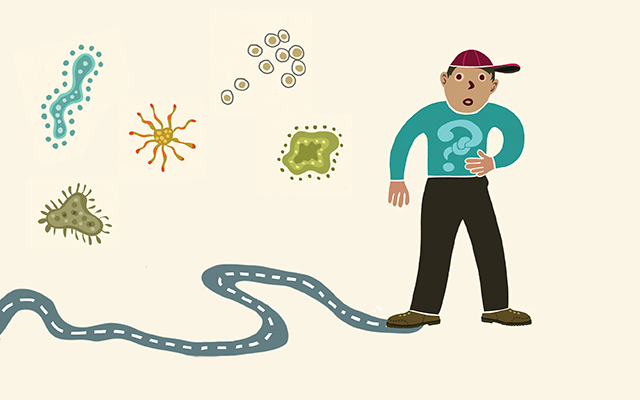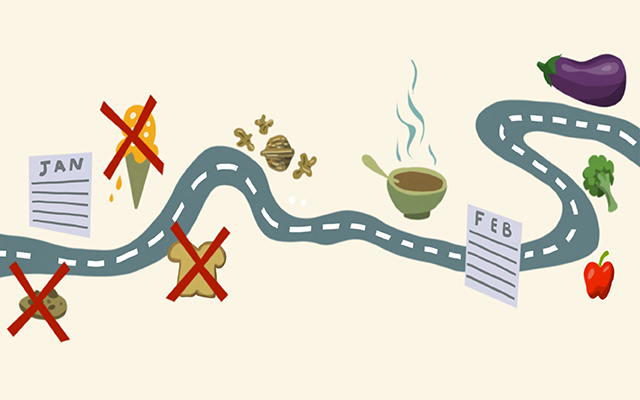Painful bloating after meals is common among IBS sufferers, and a frequent trigger for it is small intestinal bacterial overgrowth, or SIBO.
SIBO is “an overcolonization of specific bacteria, usually the colon bacteria, into the small intestine, where they don’t belong,” explains IBS researcher Mark Pimentel, MD, an associate professor of medicine at Cedars–Sinai in Los Angeles.
More than half of all patients with IBS also have SIBO, according to naturopaths Allison Siebecker, ND, MSOM, LAc, and Steven Sandberg-Lewis, ND, DHANP.
Unlike the large intestine, which is designed to host a large, diverse community of microbiota, a healthy small intestine is home to far fewer bacteria.
When microbes do colonize the small intestine, they feed vigorously on any carbohydrates they encounter.
This half-digested material ferments in the small intestine, producing hydrogen or methane gas that leads to bloating and discomfort. Bloating tends to get worse as the day goes on, and many people may feel the need to loosen their belts by evening, explains functional nutritionist Liz Lipski, PhD, CCN, CHN, author of Digestive Wellness.
Other symptoms of SIBO include flatulence, heartburn, nausea, and fatty stool or steatorrhea. A number of other health conditions are correlated with SIBO, including hypothyroidism, fibromyalgia, acne rosacea, celiac disease, and nonalcoholic fatty liver disease.
How do bacteria get into the small intestine?
Your digestive system keeps things moving thanks to the migrating motor complex (MMC), which transfers bacteria down into the lower intestine when the body is fasting between meals and at night. Anything that inhibits the MMC can allow bacteria to accumulate in the small bowel. Food poisoning, for example, may trigger gut neuropathy and stasis, leading to overgrowth. Even stress can disrupt the MMC, affecting the gut lining at the same time.
Another suspected cause of SIBO is deficient stomach acid, often from the overuse of antacids. “If you don’t have acid in your stomach protecting you from bacteria, fungi, and parasites coming in on your food, you are left wide open,” notes Lipski. Some health professionals suspect that problems with the colon’s microbiome can be a trigger; more research is still needed. Others believe that mechanical problems with the valve between the large and small intestines may cause bacteria to escape into the small bowel.
How is SIBO diagnosed?
The standard test for SIBO is a breath analysis that measures elevated hydrogen and methane, both byproducts of fermentation in the small intestine. (Excess hydrogen corresponds to diarrhea-predominant IBS; methane corresponds to constipation-dominant IBS.) The test is usually administered in a doctor’s office, but home kits are available.
Because tests tend to provide inconsistent results (both over- and underdiagnoses), many healthcare providers opt to treat SIBO symptoms without tests. According to functional-medicine practitioner Chris Kresser, MS, LAc, who sees many patients with IBS, “we have no gold-standard way of diagnosing SIBO.”
How is SIBO treated?
Because SIBO is a bacterial condition, the goal of treatment is to eradicate bacterial overgrowth. The usual protocol involves some combination of a carbohydrate-restrictive diet (like low-FODMAP) to starve the bacteria and either pharmaceutical or herbal antibiotics to eliminate them.
The standard antibiotic used is rifaximin, which works locally in the digestive system and causes fewer systemic effects.
Studies have found that herbal antibacterials — berberine, oregano, and others — perform as well as rifaximin. One herbal formula called Atrantil was developed based on research in reducing methane production in cattle.
Many find digestive supplements such as hydrochloric acid or herbal bitters helpful in reducing bacterial overload.
In general, while recovery is often slow and sometimes incomplete, many SIBO sufferers can find significant relief with these strategies within several weeks. The tendency for relapse is common; health professionals are still trying to figure out why.
This originally appeared in “Irritable Bowel Syndrome” in the January-February 2018 issue of Experience Life.



This Post Has 0 Comments